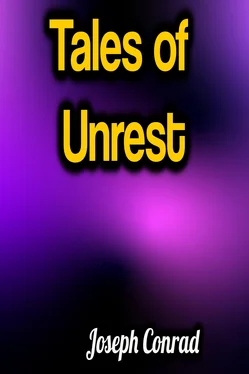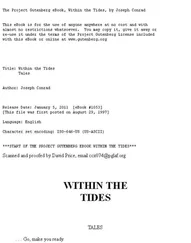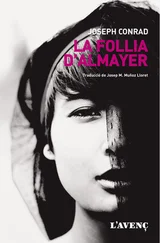Joseph Conrad - Tales of Unrest
Здесь есть возможность читать онлайн «Joseph Conrad - Tales of Unrest» — ознакомительный отрывок электронной книги совершенно бесплатно, а после прочтения отрывка купить полную версию. В некоторых случаях можно слушать аудио, скачать через торрент в формате fb2 и присутствует краткое содержание. Жанр: unrecognised, на английском языке. Описание произведения, (предисловие) а так же отзывы посетителей доступны на портале библиотеки ЛибКат.
- Название:Tales of Unrest
- Автор:
- Жанр:
- Год:неизвестен
- ISBN:нет данных
- Рейтинг книги:5 / 5. Голосов: 1
-
Избранное:Добавить в избранное
- Отзывы:
-
Ваша оценка:
- 100
- 1
- 2
- 3
- 4
- 5
Tales of Unrest: краткое содержание, описание и аннотация
Предлагаем к чтению аннотацию, описание, краткое содержание или предисловие (зависит от того, что написал сам автор книги «Tales of Unrest»). Если вы не нашли необходимую информацию о книге — напишите в комментариях, мы постараемся отыскать её.
Tales of Unrest — читать онлайн ознакомительный отрывок
Ниже представлен текст книги, разбитый по страницам. Система сохранения места последней прочитанной страницы, позволяет с удобством читать онлайн бесплатно книгу «Tales of Unrest», без необходимости каждый раз заново искать на чём Вы остановились. Поставьте закладку, и сможете в любой момент перейти на страницу, на которой закончили чтение.
Интервал:
Закладка:
IV
This is, imperfectly, what he said—
"It was after the great trouble that broke the alliance of the four states of Wajo. We fought amongst ourselves, and the Dutch watched from afar till we were weary. Then the smoke of their fire-ships was seen at the mouth of our rivers, and their great men came in boats full of soldiers to talk to us of protection and peace. We answered with caution and wisdom, for our villages were burnt, our stockades weak, the people weary, and the weapons blunt. They came and went; there had been much talk, but after they went away everything seemed to be as before, only their ships remained in sight from our coast, and very soon their traders came amongst us under a promise of safety. My brother was a Ruler, and one of those who had given the promise. I was young then, and had fought in the war, and Pata Matara had fought by my side. We had shared hunger, danger, fatigue, and victory. His eyes saw my danger quickly, and twice my arm had preserved his life. It was his destiny. He was my friend. And he was great amongst us—one of those who were near my brother, the Ruler. He spoke in council, his courage was great, he was the chief of many villages round the great lake that is in the middle of our country as the heart is in the middle of a man's body. When his sword was carried into a campong in advance of his coming, the maidens whispered wonderingly under the fruit-trees, the rich men consulted together in the shade, and a feast was made ready with rejoicing and songs. He had the favour of the Ruler and the affection of the poor. He loved war, deer hunts, and the charms of women. He was the possessor of jewels, of lucky weapons, and of men's devotion. He was a fierce man; and I had no other friend.
"I was the chief of a stockade at the mouth of the river, and collected tolls for my brother from the passing boats. One day I saw a Dutch trader go up the river. He went up with three boats, and no toll was demanded from him, because the smoke of Dutch war-ships stood out from the open sea, and we were too weak to forget treaties. He went up under the promise of safety, and my brother gave him protection. He said he came to trade. He listened to our voices, for we are men who speak openly and without fear; he counted the number of our spears, he examined the trees, the running waters, the grasses of the bank, the slopes of our hills. He went up to Matara's country and obtained permission to build a house. He traded and planted. He despised our joys, our thoughts, and our sorrows. His face was red, his hair like flame, and his eyes pale, like a river mist; he moved heavily, and spoke with a deep voice; he laughed aloud like a fool, and knew no courtesy in his speech. He was a big, scornful man, who looked into women's faces and put his hand on the shoulders of free men as though he had been a noble-born chief. We bore with him. Time passed.
"Then Pata Matara's sister fled from the campong and went to live in the Dutchman's house. She was a great and wilful lady: I had seen her once carried high on slaves' shoulders amongst the people, with uncovered face, and I had heard all men say that her beauty was extreme, silencing the reason and ravishing the heart of the beholders. The people were dismayed; Matara's face was blackened with that disgrace, for she knew she had been promised to another man. Matara went to the Dutchman's house, and said, 'Give her up to die—she is the daughter of chiefs.' The white man refused and shut himself up, while his servants kept guard night and day with loaded guns. Matara raged. My brother called a council. But the Dutch ships were near, and watched our coast greedily. My brother said, 'If he dies now our land will pay for his blood. Leave him alone till we grow stronger and the ships are gone.' Matara was wise; he waited and watched. But the white man feared for her life and went away.
"He left his house, his plantations, and his goods! He departed, armed and menacing, and left all—for her! She had ravished his heart! From my stockade I saw him put out to sea in a big boat. Matara and I watched him from the fighting platform behind the pointed stakes. He sat cross-legged, with his gun in his hands, on the roof at the stern of his prau. The barrel of his rifle glinted aslant before his big red face. The broad river was stretched under him—level, smooth, shining, like a plain of silver; and his prau, looking very short and black from the shore, glided along the silver plain and over into the blue of the sea.
"Thrice Matara, standing by my side, called aloud her name with grief and imprecations. He stirred my heart. It leaped three times; and three times with the eyes of my mind I saw in the gloom within the enclosed space of the prau a woman with streaming hair going away from her land and her people. I was angry—and sorry. Why? And then I also cried out insults and threats. Matara said, 'Now they have left our land their lives are mind. I shall follow and strike—and, alone, pay the price of blood.' A great wind was sweeping towards the setting sun over the empty river. I cried, 'By your side I will go!' He lowered his head in sign of assent. It was his destiny. The sun had set, and the trees swayed their boughs with a great noise above our heads.
"On the third night we two left our land together in a trading prau.
"The sea met us—the sea, wide, pathless, and without voice. A sailing prau leaves no track. We went south. The moon was full; and, looking up, we said to one another, 'When the next moon shines as this one, we shall return and they will be dead.' It was fifteen years ago. Many moons have grown full and withered and I have not seen my land since. We sailed south; we overtook many praus; we examined the creeks and the bays; we saw the end of our coast, of our island—a steep cape over a disturbed strait, where drift the shadows of shipwrecked praus and drowned men clamour in the night. The wide sea was all round us now. We saw a great mountain burning in the midst of water; we saw thousands of islets scattered like bits of iron fired from a big gun; we saw a long coast of mountain and lowlands stretching away in sunshine from west to east. It was Java. We said, 'They are there; their time is near, and we shall return or die cleansed from dishonour.'
"We landed. Is there anything good in that country? The paths run straight and hard and dusty. Stone campongs, full of white faces, are surrounded by fertile fields, but every man you meet is a slave. The rulers live under the edge of a foreign sword. We ascended mountains, we traversed valleys; at sunset we entered villages. We asked everyone, 'Have you seen such a white man?' Some stared; others laughed; women gave us food, sometimes, with fear and respect, as though we had been distracted by the visitation of God; but some did not understand our language, and some cursed us, or, yawning, asked with contempt the reason of our quest. Once, as we were going away, an old man called after us, 'Desist!'
"We went on. Concealing our weapons, we stood humbly aside before the horsemen on the road; we bowed low in the courtyards of chiefs who were no better than slaves. We lost ourselves in the fields, in the jungle; and one night, in a tangled forest, we came upon a place where crumbling old walls had fallen amongst the trees, and where strange stone idols—carved images of devils with many arms and legs, with snakes twined round their bodies, with twenty heads and holding a hundred swords—seemed to live and threaten in the light of our camp fire. Nothing dismayed us. And on the road, by every fire, in resting-places, we always talked of her and of him. Their time was near. We spoke of nothing else. No! not of hunger, thirst, weariness, and faltering hearts. No! we spoke of him and her! Of her! And we thought of them—of her! Matara brooded by the fire. I sat and thought and thought, till suddenly I could see again the image of a woman, beautiful, and young, and great and proud, and tender, going away from her land and her people. Matara said, 'When we find them we shall kill her first to cleanse the dishonour—then the man must die.' I would say, 'It shall be so; it is your vengeance.' He stared long at me with his big sunken eyes.
Читать дальшеИнтервал:
Закладка:
Похожие книги на «Tales of Unrest»
Представляем Вашему вниманию похожие книги на «Tales of Unrest» списком для выбора. Мы отобрали схожую по названию и смыслу литературу в надежде предоставить читателям больше вариантов отыскать новые, интересные, ещё непрочитанные произведения.
Обсуждение, отзывы о книге «Tales of Unrest» и просто собственные мнения читателей. Оставьте ваши комментарии, напишите, что Вы думаете о произведении, его смысле или главных героях. Укажите что конкретно понравилось, а что нет, и почему Вы так считаете.












